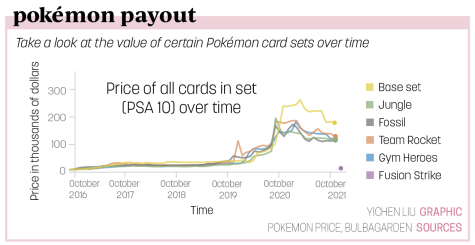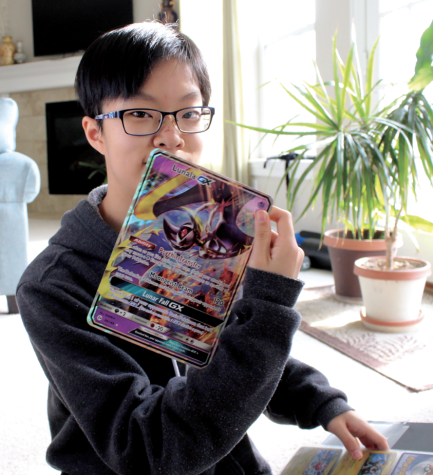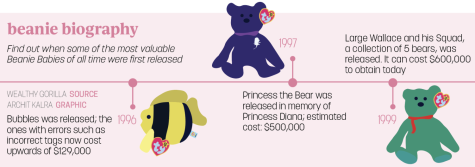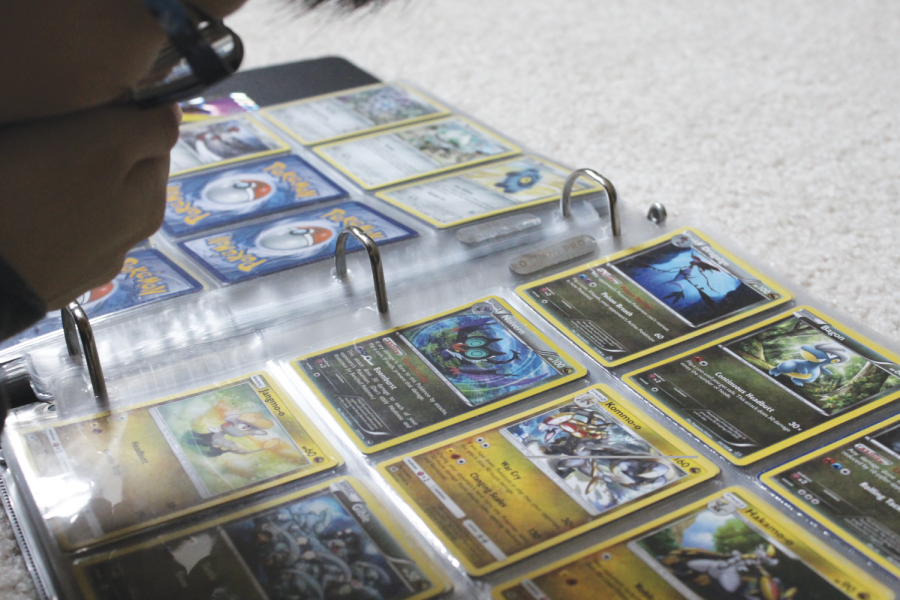Collectible trading cards have seen a recent surge in popularity. In a recent article on Spirits Collectors Daily, a sports collectibles website, Bob Means, eBay’s general manager of trading cards, said he’s seen unprecedented numbers of buyers. Sales of trading cards grews 142% from 2019 to 2020.
The numbers don’t just include sports cards. Just last month, popular YouTuber Logan Paul spent over $3 million on first-edition Pokémon cards. Niranjan Bobba, father of Dhiraj Bobba, a longtime Pokémon card trader, said he has an interest in Pokémon and analyzing the cultural trend of collecting.

“I really got into Pokémon,” he said. “Some kids that I worked with got me into it. It was a nice way to bond (and) I gained a lot of interesting knowledge, especially with how the cards are sold. Many of the kids used sites like eBay to sell their Pokémon cards.”
He said some cards were akin to prizes, and were obsessed over by many.
“The biggest rage was definitely the rarest Pokémon cards. (Kids) would usually build up a knack for trading valuable cards from a young age, with those big laminated binders that they kept their cards in,” Bobba said. “It was crazy and equally impressive with how much time these people spent working to make (a) profit on these cards. After all that time they spent trading when they were younger, they advanced into selling the cards for money (to) groups of people who all really enjoyed Pokémon.”
Sophomore Sarah Xie, a Pokémon card collector, echoed this statement.
“(Collecting Pokémon cards) were almost trendy at the time,” they said. “The binder, oh my gosh, there’s a bunch of them at my house now, still.”

Xie said they recall people buying cards whenever it was possible.
“I bought a lot of Pokémon cards,” Xie said. “Every time we went to the store I’d look at them and my mom was kind of annoyed by it because that was the only thing I’d buy.”
Moreover, Bobba said there were many personalized online platforms which grew during the Pokémon fad.
“It was so big that people were able to sell on sites that specifically look for Pokémon cards. Especially when Pokémon was going super strong, businesses definitely saw this as a way to capitalize,” he said.
However, Bobba said despite the recent surge in popularity, there is a shift in collecting Pokémon cards.
“It’s still going pretty strong,” he said, “but I don’t see it as being as much of a huge phenomenon for so many people as it was before. But Pokémon has definitely kept its own niche and created an avid base, which is necessary for a fad to turn into something with longevity.”
Along the lines of Pokémon cards, another similar phenomenon are Beanie Babies. The stuffed animal line, which, according to Business Insider, “were once one of the most sought-after toys in the world.”
Food Service provider Heidi Babcock said she witnessed the Beanie Baby craze firsthand.
 “I remember in the early 2000s I would buy so many Beanie Boos for my nieces, nephews, and any of the little kids around,” Babcock said. “I used to think they were so cute too, until I saw how people went wild over them in just a short time. Production of these Beanie Boos really ramped up, and I thought it was weird how many parents would literally crowd the aisles for Christmas to buy Beanie Boos.”
“I remember in the early 2000s I would buy so many Beanie Boos for my nieces, nephews, and any of the little kids around,” Babcock said. “I used to think they were so cute too, until I saw how people went wild over them in just a short time. Production of these Beanie Boos really ramped up, and I thought it was weird how many parents would literally crowd the aisles for Christmas to buy Beanie Boos.”
According to Business Insider, Ty Warner, the inventor of the Beanie Babies, would purposely stop production of certain stuffed animals to encourage a buying frenzy.
“I hadn’t seen such a craze over stuffed animals,” Babcock said, “it was pretty foreign to me. My nieces and nephews would tell me about all these rare collectibles, and when I looked them up they were worth thousands.”
When the fad began to die down, Babcock said her younger family members told her the same Beanie Babies which were once worth thousands were now not even a hundredth of their old price.
Xie said they believe fads such as Pokémon have had a resurgence due to nostalgia.
“I think it’s not just the (Pokémon) cards but the whole brand that’s really popular right now, like the figurines and stuffed animals from before,” Xie said. “I think now (Pokémon is) really popular again because the older cards aren’t made anymore and people want to revisit their childhood.”
Overall, Bobba said the culture of collectibles didn’t necessarily correspond to success.
“There are some phenomena which establish themselves in the market forever,” he said, “and some which just don’t.”
































![What happened to theater etiquette? [opinion]](https://hilite.org/wp-content/uploads/2025/04/Entertainment-Perspective-Cover-1200x471.jpg)














































![Review: “The Immortal Soul Salvage Yard:” A criminally underrated poetry collection [MUSE]](https://hilite.org/wp-content/uploads/2025/03/71cju6TvqmL._AC_UF10001000_QL80_.jpg)
![Review: "Dog Man" is Unapologetically Chaotic [MUSE]](https://hilite.org/wp-content/uploads/2025/03/dogman-1200x700.jpg)
![Review: "Ne Zha 2": The WeChat family reunion I didn’t know I needed [MUSE]](https://hilite.org/wp-content/uploads/2025/03/unnamed-4.png)
![Review in Print: Maripaz Villar brings a delightfully unique style to the world of WEBTOON [MUSE]](https://hilite.org/wp-content/uploads/2023/12/maripazcover-1200x960.jpg)
![Review: “The Sword of Kaigen” is a masterpiece [MUSE]](https://hilite.org/wp-content/uploads/2023/11/Screenshot-2023-11-26-201051.png)
![Review: Gateron Oil Kings, great linear switches, okay price [MUSE]](https://hilite.org/wp-content/uploads/2023/11/Screenshot-2023-11-26-200553.png)
![Review: “A Haunting in Venice” is a significant improvement from other Agatha Christie adaptations [MUSE]](https://hilite.org/wp-content/uploads/2023/11/e7ee2938a6d422669771bce6d8088521.jpg)
![Review: A Thanksgiving story from elementary school, still just as interesting [MUSE]](https://hilite.org/wp-content/uploads/2023/11/Screenshot-2023-11-26-195514-987x1200.png)
![Review: "When I Fly Towards You", cute, uplifting youth drama [MUSE]](https://hilite.org/wp-content/uploads/2023/09/When-I-Fly-Towards-You-Chinese-drama.png)
![Postcards from Muse: Hawaii Travel Diary [MUSE]](https://hilite.org/wp-content/uploads/2023/09/My-project-1-1200x1200.jpg)
![Review: "Ladybug & Cat Noir: The Movie," departure from original show [MUSE]](https://hilite.org/wp-content/uploads/2023/09/Ladybug__Cat_Noir_-_The_Movie_poster.jpg)
![Review in Print: "Hidden Love" is the cute, uplifting drama everyone needs [MUSE]](https://hilite.org/wp-content/uploads/2023/09/hiddenlovecover-e1693597208225-1030x1200.png)
![Review in Print: "Heartstopper" is the heartwarming queer romance we all need [MUSE]](https://hilite.org/wp-content/uploads/2023/08/museheartstoppercover-1200x654.png)



